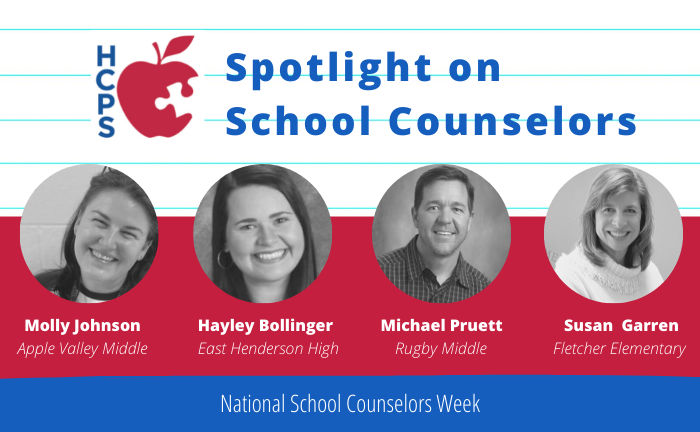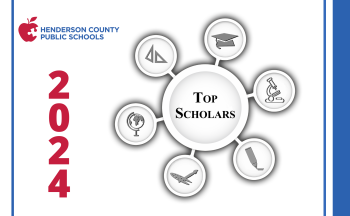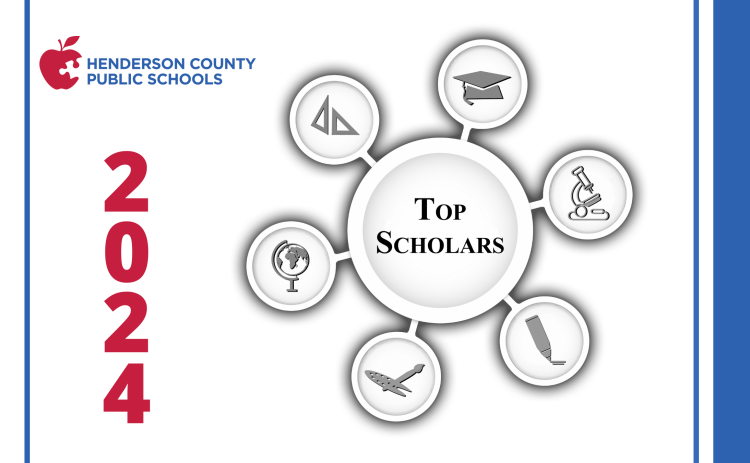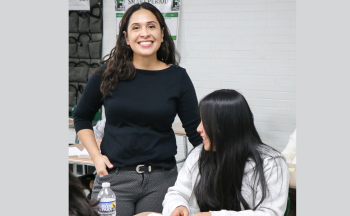‘Even after all this’: School Counselors Remain the Behind-the-Scenes ‘Nurturers of Dreams, Finders of Hope’
As the world approaches the second anniversary of COVID-19 being declared a pandemic by the World Health Organization in March 2020, school counselors everywhere continue to soldier through its repeated impacts on students. Locally, the team of 35 school counselors serving Henderson County Public Schools embody commitment, leadership, and character, and deserve special recognition during National School Counseling Week.
“Commitment,” “leadership,” and “character” are the words Matthew Gruebmeyer, Director of Student Services for HCPS, keeps revisiting to describe his team of 35 counselors working behind the scenes across Henderson County’s 23 public schools.
“Lots of folks say that a crisis reveals leadership and character,” he says. “Never before have I seen that to be more true than now, when I think about our school counselors.”
The experiences have revealed a depth of leadership, character, resilience, and strength that those outside the K-12 education environment rarely see, says Gruebmeyer. Because of this, he says, students are safer, families are stronger, and staff is better equipped for the rigors of teaching and learning amid the ongoing pandemic.
Along with school nurses and social workers, counselors across the district play pivotal and skilled roles in supporting students from kindergarten through high school. North Carolina’s counseling curriculum focuses on three areas of student achievement: academic, career, and social/emotional development.
Beneath that generalized umbrella is the story of the school counselor who walks alongside a student during the highs and lows of a young person finding their way through school, and through life. With a sustained global pandemic added to the mix, the school counselor’s role takes on an extra layer of complexity.
Counselors are not merely advisors or sympathetic ears. To become a licensed school counselor in North Carolina, an individual must be a graduate of a 60-hour accredited Master’s Degree program in counseling (e.g. School Counseling, Clinical Mental Health, College Counseling, or Career Counseling).
After the required education comes hard work and long days, mixed with both triumph and frustration. But across the HCPS district, school counselors are quick to say they remain fiercely committed to students out of a genuine desire to instill hope and nurture dreams, when some may have forgotten what it feels like to have them.
A MULTI-FACETED ROLE
In reflecting on her role pre-pandemic and currently, Apple Valley Middle’s school counselor Molly Johnson says, “Ultimately, our jobs out here have remained the same since the arrival of COVID.”
She explains, “We still help kids find success in school, their friendships, and their lives. We develop social skills, help them recognize their own self-worth, and partner with them in any challenge that is getting in the way of their learning or well-being.”
School counselors also identify and connect families to organizations that provide housing assistance, listen to struggling parents, help students learn strategies to process grief and trauma, and actively seek out students who have disappeared from their classes to reconnect them with school.
School counselors in Henderson County have a mighty reach, says Susan Garren, school counselor at Fletcher Elementary. Over the years, they have been instrumental in helping many families with basic needs such as food, clothing, housing support, mental health counseling, plus holiday assistance, hugs, and even a shoulder to cry on when needed, Garren says.
Whether it’s an elementary-age student struggling to assimilate from kindergarten to first grade, a middle school student unsure of his own abilities, or a high school senior wrestling with the weight of academic pressures, counselors teach all students lifelong coping skills that foster resilience and teach them that it is alright to ask for help.
“Life is full of challenges, but counselors help students know that there are people they can reach out to when needed,” says Garren. “We cultivate a positive attitude and a sense of hope for the future.”
THE IMPACT AND THE NEED
In addition to the more widespread inconveniences caused by the pandemic, HCPS counselors say it also ushered in some specific uncertainties and resulting challenges for students.
“Many students having been out of a normal school routine for some time now (and) the impact of that plays out in more ways than just lost academic instruction time,” says Johnson. “Delayed social skills, increased anxiety and depression, continued poor attendance, and an increase in hospitalizations due to a mental health crisis top the list.”
Michael Pruett, a school counselor with Rugby Middle said his school’s department has received more requests for counseling support than before COVID as well as a greater need for more referrals to intensive mental health support from outside therapists.
At the high school level, the types of counseling supports are even more varied. “There are so many things to juggle, from scheduling, writing recommendation letters, handling scholarships, and so much more,” observes Hayley Bollinger, a counselor at East Henderson High.
“I’m thankful to be in a position where I’m able to provide a listening ear to students and that I get to help them work toward managing their emotions and recognizing the strengths and skills they possess to overcome whatever challenges they may be facing,” Bollinger says.
When the pandemic began and school was fully virtual, school counselors supported students and their families through online platforms, home visits, and phone calls, says Garren, remembering the strategies and methods counselors used to stay connected to students. “We worked hard to disseminate critical information about resources.”
With this increased need for more counseling support, HCPS counselors say they’ve seen perceptions about school counseling evolve since COVID.
“I’ve seen the role of the school counselor shift in the eyes of the public to more of what it’s intended to be: which is someone that supports student growth in the areas of academic development, career development, and social/emotional development,” says Bollinger. “This shift is important because it advocates for school counselors to spend more time directly working with students.”
STRENGTH IN NUMBERS
Throughout it all, school counselors, teachers, nurses and resource officers have pulled together in new ways, observed Pruett.
“We have a great method for communicating, consulting, and collaborating with our full team of student support service personnel and school leadership,” he says. “We call this team our ‘Huddle’ and it includes school counselors, school social workers, the school nurse, the resource officer, and members of our administrative team who meet together every week to consult one another on our most challenging student needs.”
Garren agrees that the team approach has been essential. “We’ve definitely had to think outside of the box to find solutions this year since there have obviously been so many challenges that have come with the pandemic.” Of the outcomes, she says, “Everyone has pulled together and done such a great job sharing resources and supporting each other so that we can support our families.”
As is true for many managing stress amid the pandemic’s uncertainties, Bollinger says it has been important to recognize the things that are and are not within a counselor’s control.
“With COVID, the majority of what we have been asked to do as educators has been outside of our control, and at times that comes with some disappointment and feelings of frustration,” she says. “But I’ve also seen my school community really come together when things have been less than ideal.”
RESILIENCE AND HOPE ON THE OTHER SIDE
As schools and communities across the world adapt to living alongside COVID, counselors here at home share an encouraged outlook about the resiliency of the students they support.
“It’s just so hopeful to me that students are back with their peers and with educators who truly care about them,” says Bollinger. “Being in the school community provides an excellent opportunity to plant seeds of hope and just love on kids who may not always believe that they are worthy of love.”
Pruett adds it has been exciting to see students once again investing in their future planning and visions for themselves.
“Last year, many students would express their negative feelings and effects the pandemic had on them in the ‘here and now,’” Pruett explains. “This year, I hear students bringing up topics about their future and re-engaging with long-term goals. This, I believe, is a natural sign of hope that the pandemic is not at the center of their lives.”
Garren says that not being able to attend school in person for periods of time compelled a greater appreciation for what it means to be in school and be together. “I’ve witnessed teachers, families and our community pull together to get through the hard times,” he says. “I feel great hope that the challenges we’ve faced over the last few years will make us even stronger and more focused on helping each other as time goes on.”
“Despite all of the challenges we have faced, most kids are getting back in the groove of school and are thriving being back in the classroom and around their peers, ” observes Johnson, reflecting on the tenacity she sees in her students.
“To me, perspective is really important,” adds Bollinger. “I think it’s possible to acknowledge how exhausting COVID has been while also giving thanks for the level of normalcy that we are starting to experience.”
This week especially, join HCPS in giving thanks to the school counselors who work with our community’s children and youth to build relationships, teach resilience, find hope and nurture dreams.







